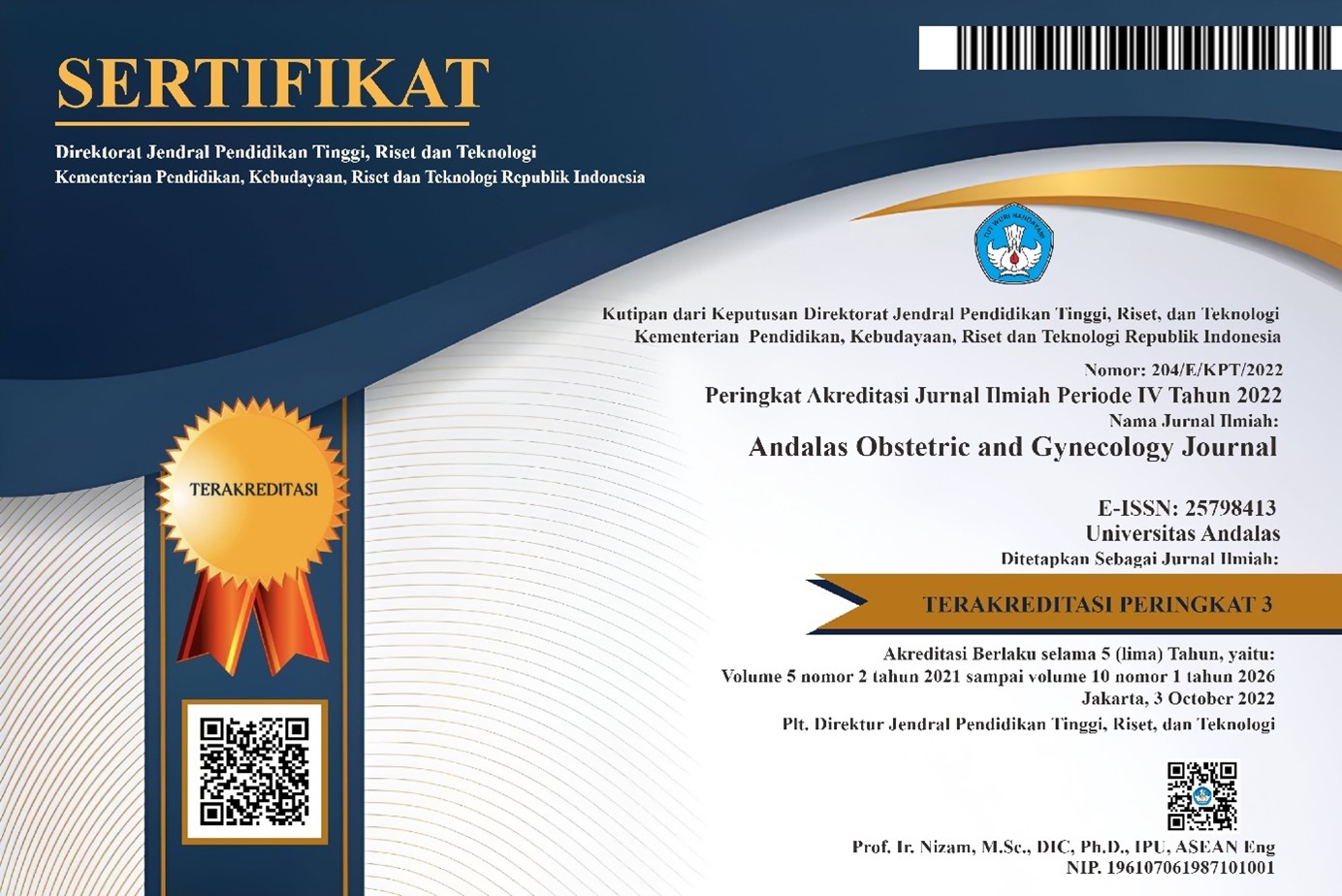Differences of Reeda Scale in Wound Incision Abdomen Post Obstetrics / Gynaecology Laparotomy with Topical Virgin Coconut Oil (VCO) and Without Topical Virgin Coconut Oil (VCO)
DOI:
https://doi.org/10.25077/aoj.5.1.90-101.2021Abstract
Introduction : Wounds are defects of normal anatomical structures and functions. Injuries can occur because of physical, chemical, or biological trauma. Wound healing is a complex process involving many cells, cytokines, growth factors, proteases, and extracellular matrix (ECM) that work together to restore the integrity of the injured tissue. Virgin Coconut Oil is an oil saturated with medium-chain fatty acids (MCFA), one of which is lauric acid. Based on our research, VCO has wound healing properties. Research conducted in vivo on rabbits and rats experienced an increase in collagen, fibroblast proliferation, and neovascularization which influenced accelerating wound healing.
Objective : This study aims to determine the difference in the mean REEDA scale in abdominal incision wounds after obstetric / gynecology laparotomy with topical VCO and those without topical VCO.
Material and methods : This study is an experimental research design with a randomized clinical trial that was conducted on 36 people divided into 2 groups (treatment and control). Post-obstetric / gynecology laparotomy patients were subjected to topical VCO application on the incision wound and the REEDA scale was calculated at 24, 48, and 72 hours post-surgery. Statistical analysis is using the Mann-Whitney test.
Results : Age mean of the respondents in the treatment group was 32.28 ± 10.42 years old, while the untreated group was 30.5 ± 6.54 years old. The mean REEDA scale for abdominal incision wounds applied topical VCO at 24 hours was 3.17 ± 1.04, at 48 hours was 2.11 ± 1.08, and at 72 hours was 1.39 ± 0.85. The mean REEDA scale for abdominal incision wounds that were not treated with topical VCO at 24 hours was 3.83 ± 0.99, at 48 hours was 3.11 ± 1.37 and at 72 hours was 2.72 ± 1.41. The findings of the experimental analyses showed that there was no association with the use of topical VCO in surgical wounds on a 24-hour REEDA scale (p>0.05), there was a relationship between the use of topical VCO in surgical wounds on a 48-hour and 72-hour REEDA scale (p<0.05). In the care group, the mean REEDA scale decreased by 33.4 % from 24 to 48 hours and 34.1 % from 48 to 72 hours.
Conclusion : There is a relationship with the use of topical VCO in post-abdominal incision wounds post obstetrics/gynaecology laparotomy with REEDA scale 48 hours and 72 hours post-surgery. The mean REEDA scale decreased by over 24 to 48 hours and 48 to 72 hours in the treatment group (who administered topical VCO in postoperative incision wounds).
Keywords: VCO, REEDA scale, Wound healing
References
Ariffin NHM, Hasham R. Potential Dermatological Application on Asian Plants. Biotechnol Bioprocess Eng. 2016; 21: 337-354.
Velnar T, Bailey T, Smrkolf V. The Wound Healing Process: an Overview of the Cellular and Molecular Mechanisms. The Journal of International Medical Research. 2009; 37: 1528-1542.
Giri JV. Factors Affecting Wound Healing. 20th Annual Conference of Indian Society of Wound Management; 2018.
Trophies, Perbina DI. The Effect of Pure Coconut Oil and Its Hydrolysis Results on Wound Parameters in 3T3 NIH Cells by In Vitro. Medan: Faculty of Pharmacy, University of North Sumatra; 2019.
Salian V, Shetty P. Coconut Oil and Virgin Coconut Oil: An Insight into its Oral and Overall Health Benefits. Journal of Clinical and Diagnostic Research. 2018; 12: 1-3.
Widiyanti RA. Utilization of Coconut as VCO (Virgin Coconut Oil) as Health Antibiotics in Supporting the Vision of a Healthy Indonesia 2015. National Seminar on Biology Education 2015; March 21 2015, 2015; Poor.
Molazem Z, Mohseni F, Younesi M, Keshhavarzi S. Aloe vera gel and cesarean wound healing; A randomized controlled clinical trial. Global Journal of Health Science. 2015; 7: 203-209.
Guo S, DiPietro LA. Factors Affecting Wound Healing. J Dent Res. 2010; 89: 219-229.
Sumiasih N, Somoyani N, Armini N. Virgin coconut oil accelerates the healing of perineal wounds at inpatient health centers in Denpasar. Husada Scale Journal. 2016; 13: 39-49.
Silalahi J, Yuandani Y, Meliala D, Margata L, Satria D. The activity of Hydrolyzed Virgin Coconut Oil to increase proliferation and Cyclooxygenase-2 expression towards on NIH 3T3 cell line in wound healing process. Open Access Macedonian Journal of Medical Sciences. 2019;7:3164-3168.
Ibrahim AH, Li H, Al-Rawi SS, Majid ASA, Al-Habib OA, Xia X. Angiogenic and Wound Healing Potency of Fermented Virgin Coconut Oil : in Vitro and in Vivo Studies. Am J Transl Res. 2017;9:4936-4944.
Downloads
Published
Issue
Section
License
Copyright (c) 2021 Andalas Obstetrics And Gynecology Journal

This work is licensed under a Creative Commons Attribution 4.0 International License.
Copyright
Authors who publish with this journal agree to the following terms:
- Authors retain the copyright of published articles and grant the journal right of first publication with the work simultaneously licensed under a Creative Commons Attribution 4.0 International License that allows others to share the work with an acknowledgment of the work's authorship and initial publication in this journal.
- Authors are able to enter into separate, additional contractual arrangements for the non-exclusive distribution of the journal's published version of the work (e.g., post it to an institutional repository or publish it in a book), with an acknowledgment of its initial publication in this journal.
- Authors are permitted and encouraged to post their work online (e.g., in institutional repositories or on their website) prior to and during the submission process, as it can lead to productive exchanges, as well as earlier and greater citation of published work (See The Effect of Open Access).
License:
Andalas Obstetrics and Gynecology Journal (AOJ) is published under the terms of the Creative Commons Attribution 4.0 International License. This license permits anyone to copy and redistribute this material in any form or format, compose, modify, and make derivatives of this material for any purpose, including commercial purposes, as long as they credit the author for the original work.







